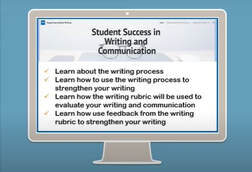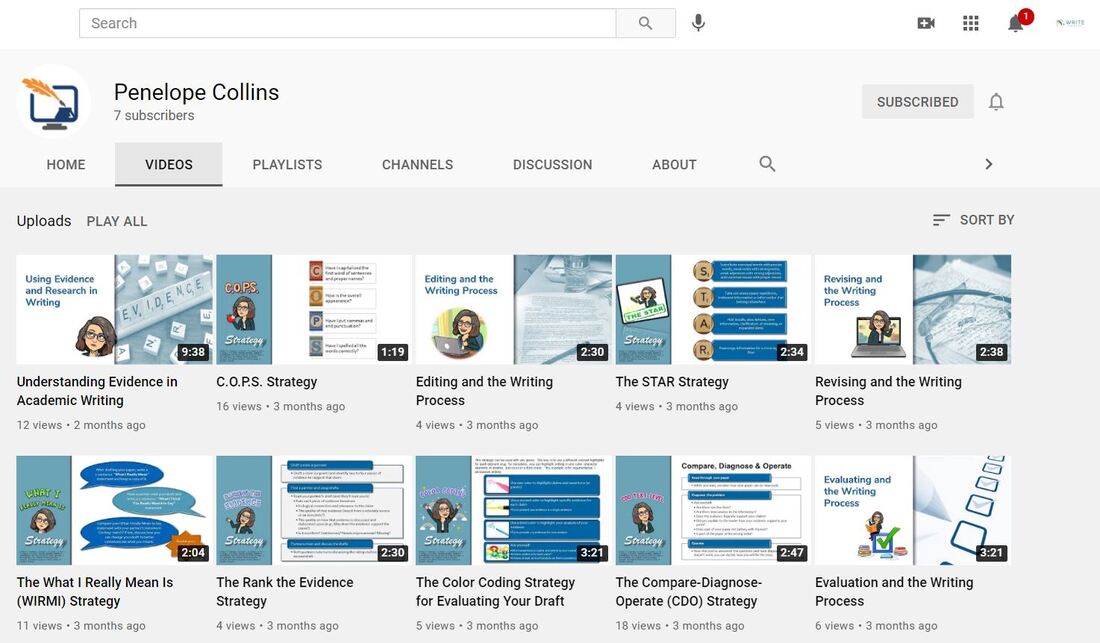|
Why is writing so challenging? Writing is a highly complex task that is impacted by cognitive, affective, and environmental factors. Students may benefit from learning about the writing process for strengthening their writing, and how rubrics and feedback work together to support revision. Despite the challenging nature of writing, it is an increasingly valuable skill throughout the lifespan. The WISE project illustrates these evidence-based strategies through short videos and handouts. These can be accessed on their website here or you can follow along in this blog as we discuss each strategy for mastering the writing process. Mastering the Writing Process Writing is a process. The writing process includes six phases (see cycle above). Strategies can support students throughout this process. These strategies will be useful when:
How do we use these six phases to be better writers? Below, Collins helps us understand each phase and what strategies best support writers. Strategies for Planning your Writing
The Do-What-When Strategy is a planning tool to help writers better understand their writing expectations. Writers create a three-column table that includes the verb in a writing prompt (the "Do"), the object of the verb (the "What"), and the development of a writing timeline is then created (the "When").
The fourth strategy is Outlining. This can be used to plan for anything you write. Start with the main focus or thesis at the top of the page followed by main ideas. Then, organize the supporting ideas within each main idea. For further explanations on how to use these strategies, reference the videos above (or visit the WISE project website). Now that your ideas are organized, you are ready to write. Strategies for Goal Setting
The SCHEME Strategy can be used to improve your approach to writing. This individualized strategy involves evaluating what you do well in writing and your habits towards writing. Based on the skills check, you develop your writing goals. The SMART Goals Strategy is great for developing effective goals in writing or any domain in your life. Start by setting a Specific goal that is Measurable, Achievable, Relevant, and Timely (SMART). Strategies for Drafting
The STOP & DARE Strategy is best used for persuasive and argumentative genres. STOP asks you to Suspend judgement and brainstorm, Take a side, Organize ideas, and Plan as you write (STOP). DARE asks you to Develop a thesis, Add supporting ideas, Reject arguments for the other side, and End with a conclusion (DARE). Drafting Mini-Arguments is another strategy that can be used for persuasive and argumentative genres. Writing mini-arguments collectively can help writers build on the larger argument as a whole. Start by drafting the claim and identify evidence to support this claim. Now, go back and decide on the stronger arguments that can be added to the writing paper. Frameworks For Structuring Your Paper
Strategies for Evaluating Writing
Strategies for Revising
The STAR Strategy is used individually and it requires four steps. These include Substituting overused words or fillers, Taking out unnecessary information, Adding details, and Rearranging the information (STAR). The What I Really Mean is (WIRMI) Strategy is used with a partner. This strategy helps writers see if they really are conveying the ideas in their head accurately and clear in their writing. Strategies for Editing your Writing The final step in the writing process is editing. While proofreading, writers are paying attention to grammar, spelling, and punctuation. To edit, writers can use the COPS Strategy. The strategies Collins explains on the WISE project website are great tools to introduce to secondary students. Most of the strategies we discussed are from the IES Secondary Writing Practice Guide. More detailed and engaging instructions on how to use these strategies are available on the WISE project website. Visit the website to access these mini tutorials and resource documents.
Paula Obermeyer
8/5/2021 07:03:11 pm
I would like to implement the WISE project writing process in my 6th-grade classroom. Where may I obtain clear images of the PLAN and SCHEME strategies (and the other process strategies) to have student reference posters created? Comments are closed.
|
Archives
September 2023
Categories
All
|
WRITE Center: Writing Research to Improve Teaching and EvaluationThe research reported here was supported by the Institute of Education Sciences, U.S. Department of Education, through Grant R305C190007 to University of California, Irvine. The opinions expressed are those of the authors and do not represent views of the Institute or the U.S. Department of Education.
|
© COPYRIGHT 2019. ALL RIGHTS RESERVED.
|














